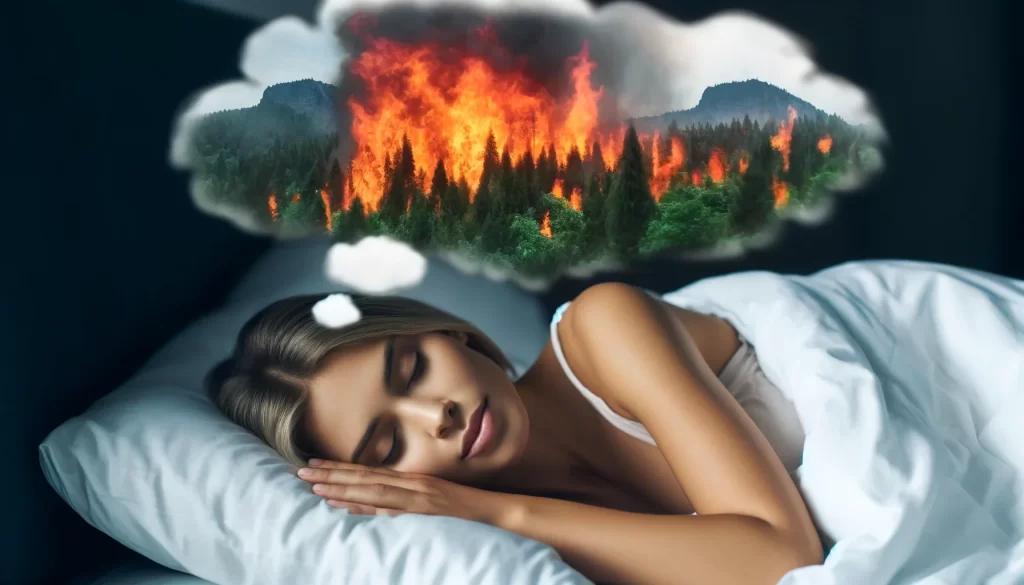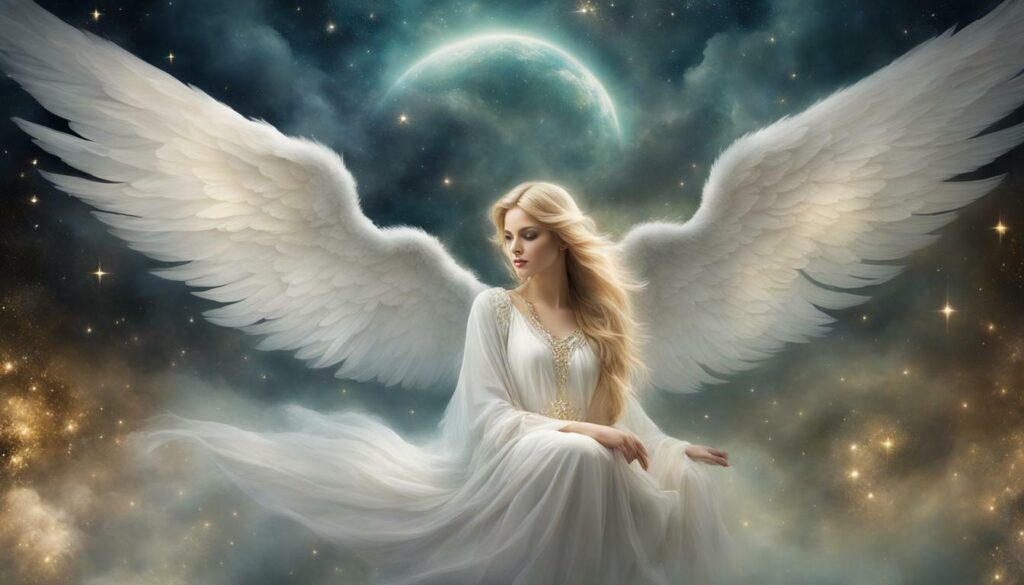We often traverse a mystifying landscape when we close our eyes at night. Among the enigmatic visuals the subconscious conjures up, wildfire dreams can be one of the most powerful and thought-provoking.
While the majority of dreams are remembered if they happen during REM sleep periods, wildfire dreams, regardless of when they occur, can leave a lasting impression, urging us to uncover their hidden messages.
Dreaming about wildfires often symbolizes uncontrolled emotions, destructive thoughts, or a situation in life that feels overwhelming and out of control. These dreams can reflect fears of loss, significant changes, or crises that consume the dreamer’s thoughts and emotions. Additionally, a wildfire in a dream may indicate a need for transformation or cleansing, albeit through challenging or intense circumstances.
By probing into these vivid nocturnal narratives, we may discover not only a reflection of our emotions but also a call to action that resonates in our waking lives.
Key Takeaways:
- REM sleep often harbors the most memorable dreams, including those with wildfire imagery.
- Wildfire dreams may represent a wide range of emotions and personal transformations.
- Dream analysis helps link fiery visions to potential stresses or desires that need attention.
- Dream experts see an increase in fire-related dreams as a reflection of collective experiences and individual concerns.
- Understanding the nuances of dream meanings can provide insights into our emotional and psychological states.
Symbolic Meanings of Wildfires in Dreams

When we delve into the symbolic meaning of wildfires within our subconscious, we often uncover a complex interplay between destruction and renewal.
These dreams can serve as a metaphor for transformation, mirroring the reality that to create new beginnings, sometimes the old must be shed.
Like the natural cycle where a forest blooms anew after a fire, our dream landscapes mirror this profound cycle of rebirth.
This idea is particularly relevant when we look at real-life events, such as the 1991 Oakland Hills Firestorm, which tragically claimed 25 lives and turned over 3,000 homes and apartments into rubble.
Experiencing such a devastating event inevitably leaves an indelible mark on the psyche, not just for the direct survivors but also for the community at large.
An insightful study analyzing dream journals and questionnaires, like the Beck Depression Inventory, postulates that dream symbolism after such traumatic experiences is not simply a mirror of loss but can be a canvas for processing and healing.
Destruction and Renewal
The participants of the study, categorized into Fire Survivors, Fire Evacuees, and a Control Group, present us with a poignant picture of the individual and collective subconscious at work.
For many who lost their homes, dreams became a space to grieve and reconcile with their stark new realities.
Depression and survivor guilt plagued the Fire Evacuees, indicating how narrowly escaping destruction could still yield a heavy emotional toll.
It underscores the dream symbolism, where wildfires are not only about the literal loss but also signify the mental and emotional upheaval that comes with near misses.
Uncontrolled Emotions
Similarly, the uncontrolled nature of a wildfire can often symbolize the chaotic surge of emotions we may feel unable to contain.
Intrusive thoughts, nightmares, and profound reactions, especially as anniversaries of such events draw near, speak to this destruction and renewal in dreams.
For many survivors, dreams also reawakened unresolved emotions from past traumas, indicating how our minds can use the imagery of wildfires as an outlet for pent-up distress—a call for emotional release and healing.
Through the lens of dream symbolism, the transformative potential of wildfires stands out: even the most grievous of circumstances can foster growth and new beginnings.
Importantly, the progression of post-traumatic nightmares can symbolize the gradual journey from being haunted by an event to finding peace, as seen in the less fixated, evolving nature of dreams over time with proper care and support.
Understanding the symbolic meaning of wildfires in our dreams allows us to navigate the complex terrain of our internal worlds, recognizing the potent interconnection of destruction and rebirth that defines so much of the human experience.
Common Themes in Wildfire Dreams

As we delve into the common themes in wildfire dreams, it’s crucial to acknowledge that these are not mere figments of our imagination.
They are often reflective of deep-seated emotions and experiences. For individuals who have lived through wildfires, such as the devastating 1991 Oakland Hills Firestorm—which tragically claimed 25 lives and destroyed over 3,000 homes—the imprint left on the psyche can be indelible.
In a study published in Deirdre Barrett’s “Trauma and Dreams” (1996), affected individuals, including fire survivors and evacuees, shared their experiences through interviews, questionnaires, and dream journals.
This seminal work highlighted that common themes in wildfire dreams often revolve around a profound sense of feeling overwhelmed and a desperate need for escaping wildfires.
Feeling Overwhelmed or Out of Control
Many dreamers described scenarios where the fierce, uncontrollable nature of wildfires was a central theme.
Particularly among the Fire Evacuees group in the study, who outnumbered Fire Survivors, there was an escalated sense of survivor guilt, depression, and intrusive thoughts, implicating a deeper emotional distress.
Feelings of being overwhelmed surfaced as a poignant part of their narrative, where coping mechanisms were evidently strained, if not altogether overrun.
Escaping or Surviving a Wildfire
- Building Resilience: The desire to survive or escape in these dreams spoke to an innate resilience that echoes the human spirit’s will to overcome adversity.
. - Processing Trauma: Post-fire dreams frequently reengage with grief from earlier life traumas, implying that such dream themes act as a conduit for processing pain.
. - Anniversary Reactions: As the first anniversary of the Oakland Firestorm approached, survivors’ dreams intensified, underscoring the profound emotional challenges anniversaries of such events pose.
The emphasis on escaping wildfires in dreams can also extend beyond those directly affected by such disasters.
The study included participants across a broad age spectrum, from 22 to 70 years old, capturing a wide array of personal backgrounds and life experiences.
Even when faced with the global trauma of 9/11, dreams analyzed did not replay the events themselves.
Instead, they revealed an increase in dream intensity, suggesting that our subconscious minds may interpret and express collective distress in varied, symbolic ways.
In conclusion, as we analyze these themes, it is apparent that wildfire dreams can embody our deepest fears, struggles, and the unrelenting drive to persevere.
Each dream offers a chance to confront and navigate the emotional landscapes we otherwise might not traverse in our waking lives.
Psychological Perspectives on Dreaming About Wildfires

We often overlook the profound influence our daily experiences and emotional states have on our dreams.
Particularly, the imagery of wildfires often signals a metaphorical inferno within our psyche.
When we examine the psychological perspectives on wildfire dreams, we delve into a world where our innermost anxieties and traumas are manifesting in vivid, often unsettling scenarios.
Stress and Anxiety Manifestations
Our dreams about wildfires can be striking representations of stress and anxiety.
Take, for example, the historic 1991 Oakland Hills Firestorm. The calamitous event claimed twenty-five lives and decimated over 3,000 homes and apartments.
Studies like those conducted by Dr. Alan Siegel suggest that for many, such disasters continue to live on in dreams, unveiling layers of persistent stress, fear, and tension associated with catastrophic events.
A compelling fact emerging from these studies is the significant impact on those who even narrowly escaped the flames—the Fire Evacuees.
Their experiences were characterized by relentless survivor guilt, depressive symptoms, and harrowing nightmares, poignantly highlighting how narrowly escaping disaster can be as psychologically scarring as enduring it.
Processing Trauma
In disentangling the complexities of trauma processing, the psychological implications become even more profound.
Wildfire dreams aren’t merely night-time musings; they are pivotal in the post-traumatic healing process.
These dreams can rekindle grief from prior traumatic experiences, emphasizing how current events can reactivate past wounds.
Insights gained from the responses of firestorm survivors as they approached the first anniversary of the tragedy revealed a notable transformation of post-traumatic nightmares.
With the passage of time and compassionate care, the content of these dreams can evolve, reflecting a journey towards healing and adaptability.
Recurrent dreams of uncontrolled fires might initially symbolize overwhelming life challenges but eventually, may morph into narratives of creativity, spiritual awakening, or a resolute push for positive change.
Dreams about extinguishing fires or struggling to light them often symbolize our innermost efforts to control tumultuous emotions or navigate roadblocks on our life path.
Hence, becoming conversant with our dreaming mind can offer us subtle, yet valuable public health benefits—bolstering our resilience when facing collective crises like the COVID-19 pandemic, as evidenced by over 2,500 responses in recent dream surveys pointing towards heightened dream activity during such stressful times.
In essence, our dreams about wildfires are not just fleeting images; they are a powerful interface between our waking life and subconscious, offering us clues for personal growth and the fortitude to surmount adversity.
Cultural and Environmental Influences

As we delve into the complex tapestry of factors that shape our dreams, it’s clear that both cultural and environmental influences on dreams are profound.
Dreams are not merely internal echos; they are also reflections of the world around us, telling stories about our interactions with nature and society.
Within this context, real-world wildfires have become a particularly salient topic, gripping the collective subconscious of communities and nations.
Impact of Real-World Wildfires
Real-world wildfires, burning with both literal and metaphorical heat, have etched their intensity into our minds.
Statistics show that from 1985 to 2017, western US forests bore witness to a significant increase in the severity and area of burns, a trend strongly linked to warmer and drier fire seasons.
Anthropogenic climate change has been at the forefront, pulsing through climate indices and elevating both wildfire risks and occurrences.
These environmental changes do not occur in isolation — they bleed into our dreams, crafting narratives that mirror the heightened anxiety and consciousness of environmental crises.
A study focusing on California’s wildfire simulations in light of climate change anticipates even more extreme wildfire events as the planet continues to warm.
Cultural Symbolism
- In Yosemite National Park, the intersection of environmental realities and cultural significance has led fire archeologists to take proactive steps in protecting vulnerable cultural resources against wildfires. This blend of fire management and the preservation of history encapsulates a deep respect for both nature and culture.
. - The impact of fires on archeological sites and artifacts extends beyond natural phenomena; it represents a loss of cultural memory and symbolizes the fragility and impermanence of human creations.
. - Protection measures for these sites, including pre-and post-burn assessments and fuel clearing, not only recognize the importance of safeguarding our heritage but also echo a wider cultural symbolism linked to resilience and adaptation in the face of natural adversities.
The conversation around wildfires, therefore, is not just about environmental stewardship—it’s about understanding how deeply wildfires are woven into our cultural fabric.
The historical record of multi-season climate-synchronized forest fires and wildfire-driven forest conversions speaks to a long-standing dialogue between humanity and nature, sculpting our physical and dream landscapes.
Interpreting Your Wildfire Dreams

When we encounter the intense imagery of wildfires in our dreams, it’s often a call for in-depth interpretation.
These dreams can be rich with symbolism and emotional content, and digging into their layers can provide valuable insights.
Interpreting wildfire dreams is not just about analyzing the vivid scenes they present; it’s about connecting them to our innermost thoughts and feelings.
Let’s delve into the specifics of how to interpret and find personal meaning in these fiery nocturnal visions.
Analyzing Context and Emotions
Analyzing the context in which the wildfire appears in your dream is the first step towards understanding.
Was the fire raging uncontrollably, or did you find yourself trying to put it out?
Perhaps it was a mere background element, or you might have been watching the flames from a distance.
Each scenario unpacks a different layer of our subconscious, revealing our hidden fears, desires, or turmoil.
Similarly, the emotions felt during the dream are telling—a feeling of fear might reflect anxiety in life, while curiosity could signify a readiness for change.
Reflecting on Personal Meaning
The personal meaning of a wildfire dream may vary greatly from one person to another.
Dreaming about a house on fire could symbolize transformative changes in your personal life or career.
Whereas a dream about being rescued from a fire might highlight your need for support during challenging times.
It’s essential to consider one’s personal experiences, especially for those who have encountered real-life wildfires.
Their dreams may not only reflect past trauma but also the journey toward recovery and the hope for a renewed future.
Our quest for interpreting wildfire dreams also includes looking at the recurring patterns.
Are you repeatedly dreaming of a fire-related theme? These recurring dreams might emphasize a particular issue or emotion in your real life that requires your attention—perhaps a transformation or the release of pent-up emotions.
By embracing the unique process of analyzing context and understanding the personal meaning, we not only unravel the roots of our wildfire dreams but also empower ourselves to take control of our narrative, both in our dreams and waking lives.
Tips for Handling Disturbing Dreams

Whether you’re wrestling with the occasional nightmare or struggling with a recurring pattern, handling disturbing dreams can be a crucial component of maintaining your mental and emotional well-being.
Nightmares, more common in childhood but persist in up to 85% of adults occasionally, can cause significant distress, impacting daily functioning and even our health.
Understanding how to tackle them effectively is a step towards better sleep and overall health.
Techniques for Reducing Anxiety Before Bed
To start reducing anxiety before bedtime and potentially mitigate nightmares, consider implementing a relaxing bedtime routine.
Studies have shown that certain activities can prompt a more peaceful nighttime experience.
Progressive muscle relaxation techniques, for instance, can help by activating your body’s natural relaxation response and have been effective in reducing nightmares.
Similarly, practices such as imagery rehearsal therapy invite you to reimagine your nightmares with a positive outcome, actively rewriting the storyline in a way that can lessen their frequency and severity.
- Avoid alcohol or heavy snacking before bed, as they can disrupt your sleep and stimulate unwanted dreams.
. - Consider melatonin supplements responsibly, as they can influence the architecture of your REM sleep, where most dreaming occurs.
. - Create a calming environment, understanding that while silence is essential for a sleep routine, soft background noise could provide comfort for those sensitive to nighttime disruptions.
When to Seek Professional Help
Recurring nightmares, especially those causing distress or impairment in your daily life, may be indicative of a nightmare disorder or other underlying conditions.
When frequent nightmares are linked to sleep disorders, mental health issues like depression, or even cardiovascular concerns, it is crucial to address them.
Professional help for dreams becomes vital when self-help techniques do not alleviate the problem.
Cognitive-behavioral therapy is hailed as beneficial for both adults and children dealing with persistent nightmares.
Medications and various behavioral therapies, tailored to individual needs, can offer effective treatment routes when professional assistance is sought.
- Pay attention to how often nightmares occur and any impact they may have on your daily functioning.
. - Consider underlying health issues; your nightmares could be a symptom of a broader problem.
. - If you experience distress or impairment at work or in social interactions because of your dreams, don’t hesitate to reach out to a healthcare professional.
We understand how unsettling it can be to navigate the complex world of dream interpretation, particularly when faced with disruptive sleep patterns.
Remember, seeking support is a sign of taking control, not defeat, and can pave the way to restorative sleep and peace of mind.
Conclusion
As we bring our exploration of wildfire dream analysis to a close, it is clear that the fiery depths of our subconscious offer profound insights.
Throughout this article, we have delved into how interpreting dreams about wildfires acts as a mirror to our internal emotional states, often unveiling feelings of stress, trauma, and the need for change.
We’ve seen real-world instances, such as the 1991 Oakland Hills Firestorm, lead to intense psychological studies, demonstrating that the impact of such catastrophic events extends far into the realm of dreams.
Researchers like Siegel and Hartmann have illuminated how the repercussions of wildfires affect survivors and evacuees uniquely, with both groups navigating their way through a process of recovery and understanding.
Symbolic interpretations of dreams have shown us that the motifs of destruction and rebirth carry significant weight in our nocturnal narratives.
In deciphering these elemental symbols, we uncover the resilience of the human spirit—similar to the millions of readers captivated by the sprawling sagas of A Song of Ice and Fire who vicariously endure adversity through the pages of George R.R. Martin’s epic series.
Intricately intertwined, our dreams and cherished stories reflect our journey through trial and triumph.
The mastery over our nightmares, as Hartmann suggests, comes as trauma is processed and overcome, signifying that with time, healing is possible.
In this interpretation of dreams conclusion, we’ve uncovered that while dreams can often serve as an echo of past distress, they can also signal communal resilience.
By understanding our wildfire dreams, we empower ourselves to address unresolved fears, to heal, and to grow.
We hope that as we become more familiar with the language of our dreams, we contribute not only to personal well-being but to a broader public health perspective—allowing us to face our fiery trials with renewed strength and collective resolve.
Frequently Asked Questions
Q: What is the Spiritual meaning of dreaming about wildfires?
Dreaming about wildfires can symbolize powerful transformation, uncontrollable forces, or deep passions that may be consuming aspects of your life. It often represents purging of the old to make way for new beginnings or changes.
Q: What is the Biblical meaning of dreaming about wildfires?
In a biblical context, dreaming of wildfires may represent divine wrath or cleansing. Fire in the Bible is often seen as a tool for purification or a manifestation of God’s power to bring about change and enforce judgment.
Q: What does it mean when you dream about fire burning?
Dreaming about fire burning can be interpreted in various ways depending on the context. Generally, it might symbolize passion, transformation, or destruction. It can suggest that something within or outside of you is undergoing a significant change or end.
Q: Is it good or bad to see fire in a dream?
Seeing fire in a dream can be both good or bad, depending on the nature of the fire and the feelings associated with it in the dream. A controlled fire might suggest renewal and purification, while an out-of-control fire might indicate fear or loss.
Q: What does it mean to dream about fire in Hindu astrology?
In Hindu astrology, dreaming about fire is generally seen as a sign of purification, energy, and protection. However, the interpretation can vary based on the dream’s details—whether the fire was calming or threatening can influence its meaning.
Q: What does it mean when you dream about fire and water?
Dreaming about fire and water together might symbolize conflicting emotions or a clash between two powerful states of being. This dream can indicate a need for balance between control and letting go, or it might represent the union of opposites, leading to transformation and renewal.


